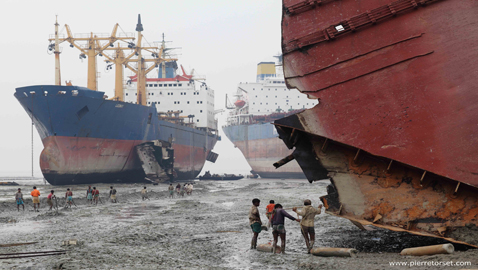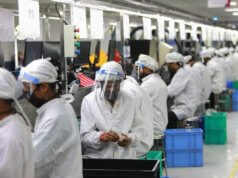
A global coalition of environmental and human rights organisations seeking to prevent unsafe ship breaking worldwide has released a complete list of the ship owners who had sold their ships for breaking last year. The list also provides details of the ships sold for breaking such as their name, flag, type, year built and gross tonnage.
As per the list released by the Brussels-based NGO Shipbreaking Platform, 641 ships out of the 1,026 ships dismantled globally in 2014 were sold to substandard ship breaking facilities in India (309), Pakistan (110) and Bangladesh (222). The ships sold to the South Asian ship breaking yards represented 74 per cent of the total gross tonnage scrapped.
Out of the 309 ships that were sold for breaking at Indian ship breaking yards, Alang in Gujarat received the lion’s share with 288 ships. The rest came to Mumbai (19 ships) and Kolkata (two ships).
Shipbreaking Platform considers ship breaking yards in South Asia to be unsafe and environmentally lacking. In India, Pakistan and Bangladesh, ships are directly dismantled on tidal beaches.
End-of-life ships contain toxic materials such as asbestos, heavy metals, polychlorinated biphenyls, oil residues and organic waste within their structures. It is not possible to either contain or safely remove these wastes on a tidal beach. The soft sands on tidal beaches cannot support crucial safety measures or emergency response equipment and allow pollution to seep directly into the coastal zone environment.
Considering that dismantling of ships is a severely hazardous activity, ship breakers have the responsibility to ensure availability of adequate infrastructure such as cranes and also implement necessary health and safety measures. On South Asia’s ship breaking beaches, vulnerable migrant workers, many of them children, break apart massive and toxic ships by hand, often without shoes, gloves, hard hats or masks to protect their lungs from asbestos and poisonous fumes. The International Labour Organisation considers ship breaking on beaches to be among the world’s most dangerous jobs. A recent study conducted for the Indian Human Rights Commission expressed major concerns about the poor living conditions of ship breaking workers in Alang.
In 2014, the Shipbreaking Platform reported 23 deaths and 66 severe injuries due to accidents such as explosions and workers crushed under steel plates and falling from heights on South Asian beaches.
“South Asia is still the preferred dumping ground for most ship owners as environmental, safety and labour rights standards are poorly enforced there,” said Patrizia Heidegger, Executive Director, Shipbreaking Platform.
“Ship owners sell their ships to the beaching yards for considerably greater profit than the price they could obtain by cooperating with modern ship recycling facilities. It is shameful for the shipping industry that so many ship owners choose to close their eyes to the realities on-the-ground in South Asia and do not to face up to their responsibility and demand clean, safe and just ship recycling,” she added.
German ship owner Ernst Komrowski topped the list of the worst global dumpers with 14 end-of-life vessels sold to the beaches. South Korea’s largest container ship owner Hanjin Shipping ranked second with 11 ships. Switzerland-based Mediterranean Shipping Company, the second largest container ship operator in the world, ranked third with seven ships. In 2009, MSC’s ship breaking activities in India had cost the life of six workers when a fire broke out on MSC Jessica.
Brazilian oil giant Petrobras which dumped six end-of-life vessels in South Asia ranked fourth. Among companies that had sold five end-of-life vessels each to beaches in South Asia are Germany-based Conti, Greece-based G Bulk and Danaos, Italy-based Ignazio Messina, US-based TBS, Singapore-based Pacific International and Taiwan-based Yang Ming.
Shipbreaking Platform advises ship owners on what they can do to ensure sustainable end-of-life policies for their fleet. It currently counts 13 major ship owners who practice clean and safe ship recycling in modern facilities off the beach.
The list released by the Shipbreaking Platform revealed that 34 per cent of the gross tonnage broken in South Asia last year was European. Amongst the ships dismantled in 2014, 285 were either owned by a European company or flying the flag of an EU member state. Two thirds of these ships, including many that primarily operated in European waters, were beached. The large European shipping nations such as Greece and Germany topped the list of worst dumping countries in 2014, selling 70 and 41 large ocean going vessels respectively to South Asian breakers. These ship-owning countries sell almost exclusively to South Asian breakers rather than to modern recyclers.











